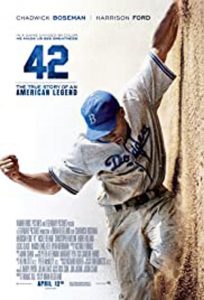Baseball Icon Branch Rickey Gets the Jimmy Breslin Treatment
The late Branch Rickey was a baseball icon. He was former part-owner of a National League team, the fabled Brooklyn Dodgers. The team was based in Brooklyn, New York. Rickey is best known for breaking the color barrier in 1947, by hiring Jackie Robinson, who was the first African-American to play in the big leagues.
The person who penned this riveting story was Jimmy Breslin. He was a newspaper columnist, mostly writing for the “New York Daily News.” Breslin also penned a few books, one in 2011, entitled: “Branch Rickey,” is the primary source for this commentary. This book inspired the actor Harrison Ford in his portrayal of Rickey in the 2013 hit movie, “42.” Actor Chadwick Boseman played Robinson, whose uniform number was 42.
Breslin died in 2018, at 88 years of age. Another of his sportsbooks which gained some notoriety was: “Can’t Anybody Here Play This Game?” Breslin won a “Pulitzer Prize” for his writings.
The “Rickey” book is on the short side, but full of rich anecdotal descriptions, which was a Breslin trademark. The book centers on Rickey’s rise from a son of the midwest farm belt (Scioto County, Ohio) to a titan, who ends up in Baseball’s Hall of Fame. As a baseball manager, ubiquitous cigar in mouth, Rickey transformed the major league’s sports by daring to break the race barrier with Robinson. He served with the Dodgers from 1942 to 1950.
 Rickey is described by the author as someone who carried within himself, “a midwestern Christian fervor as strong as a wheat crop, and a political faith in anything Republican.” One of his partners with the Dodgers was George V. McLaughlin, a lawyer and banker, a fervent Democrat, a supporter of FDR, and a proud Irish-American from NYC. His nickname was “‘George the Fifth’ because he was in charge wherever he went and if he took a drink of Scotch that was none of your business,” Breslin tells us.
Rickey is described by the author as someone who carried within himself, “a midwestern Christian fervor as strong as a wheat crop, and a political faith in anything Republican.” One of his partners with the Dodgers was George V. McLaughlin, a lawyer and banker, a fervent Democrat, a supporter of FDR, and a proud Irish-American from NYC. His nickname was “‘George the Fifth’ because he was in charge wherever he went and if he took a drink of Scotch that was none of your business,” Breslin tells us.
In 1943, the Dodgers’ team, in the middle of WWII, was “$800,000 in debt.” By the time, Rickey sold out his interest in 1950, it was worth millions of dollars.
To his credit, Rickey was an innovator. He introduced full-time spring training for major league teams, the batting gage, batting helmets, and even, would you believe – pitching machines! Breslin added this zinger: “Rickey invented the baseball farm system.”
Breslin quoted a conversation that Rickey had with the famous radio announcer for the Dodgers, Walter “Red” Barber. At a restaurant in 1943, in Brooklyn, Rickey said, “I’m going to bring a Negro to the Brooklyn Dodgers. I don’t know who he is or where he is, but he is coming.”
In 1946, Robinson played for the Dodgers’ farm team, the Montreal Royals. With that team, Robinson got a signing bonus of “$3,500 and a salary of $600 a month.” The president of the International League, Frank Shaughnessy, warned Rickey that if Robinson played in Baltimore against the Orioles, “the public would riot.” He was wrong. It never happened. The Orioles fans loved him.
The only riot, Rickey, underscored was “an autograph riot.” Robinson had a terrific year for the Royals, “he hit .349 and stole forty bases.” Nevertheless, most of the local NY print media was hostile to the precedent-setting move. The sports editor for the “New York Daily News,” Jimmy Powers, led that pack of wolves. He wrote a staggering “eighty columns against Rickey.” (This is a few more than I ever wrote against Britain’s Margaret Thatcher!)
Not all the sports’ scribes, however, followed his negative line, and David Egan of the “Boston Record,” a Hearst tabloid, was one of them. He hit major league baseball with this one-liner: “How can you claim to represent the nation while you exclude anybody, not of the Caucasian extraction.”
By the spring of 1947, the deed would be done. Although Robinson was still under contract with the Royals, he was at the Dodgers’ camp in Panama. Leo Durocher was the coach. On that team would be the likes of “Gil Hodges, Pee Wee Reese, Duke Snider, Hal Greggs, and Dixie Walker.” The only player complaining about Robinson’s move was Walker. Unfortunately, before the season began, Durocher was “suspended for the year for gambling.”
 Robinson was signed to a Dodgers’ contract on April 10, 1947. Even in spring training, the race-baiting began. One of the worse offenders was the manager of the Philadelphia Phillies, Ben Chapman. At Ebbets Field, standing at the top of the dugout, he barked loudly at Robinson as he came up to the plate: “Hey n….. go back to the cotton field where you belong.” Robinson, maintaining his dignity per his agreement with Rickey, didn’t reply.
Robinson was signed to a Dodgers’ contract on April 10, 1947. Even in spring training, the race-baiting began. One of the worse offenders was the manager of the Philadelphia Phillies, Ben Chapman. At Ebbets Field, standing at the top of the dugout, he barked loudly at Robinson as he came up to the plate: “Hey n….. go back to the cotton field where you belong.” Robinson, maintaining his dignity per his agreement with Rickey, didn’t reply.
The next time, Chapman pulled that ugly stunt, Eddie Stanky of the Dodgers replied to him: “You yellow belly. You know he can’t answer you. I’d like to see you do it if he was free to fight back.” Robinson to his credit, survived all of the hostile receptions. By the year, 1949, he came into his own. “He played in 156 games, had 206 hit, 16 home runs, 124 runs batted in, and hit .342.”
Thanks to the wisdom and courage of Rickey, Robinson was given an opportunity to play baseball in the major league. He made the most of it in a highly successful ten-year career (1947-56). See, https://www.baseball-
Besides the Dodgers, Rickey also served as a general manager for the St. Louis Cardinals and the Pittsburg Pirates. He died in 1965 and was posthumously chosen for the Hall of Fame in 1967.
Feature Image by stanbalik from Pixabay

Bill Hughes is an attorney, author, actor and photographer. His latest book is “Byline Baltimore.” It can be found at: https://www.amazon.com/William-Hughes/e/B00N7MGPXO/ref=dp_byline_cont_book_1

